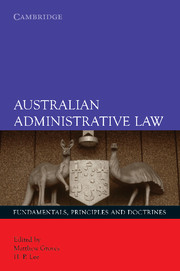Book contents
- Frontmatter
- Contents
- Foreword
- Preface
- About the contributors
- Table of cases
- Table of statutes
- 1 Australian administrative law: The constitutional and legal matrix
- 2 Administrative law in Australia: Themes and values
- 3 The public/private distinction in Australian administrative law
- 4 Australian administrative law: The human rights dimension
- 5 Administrative tribunals
- 6 Australian Ombudsman: A continual work in progress
- 7 Freedom of information
- 8 Delegated legislation
- 9 The concept of ‘justiciability’ in administrative law
- 10 Standing
- 11 Reasons for administrative decisions: Legal framework and reform
- 12 Relevant and irrelevant considerations
- 13 Improper purpose
- 14 Reasonableness, rationality and proportionality
- 15 The ‘no evidence’ rule
- 16 Failure to exercise discretion or perform duties
- 17 Procedural fairness: The hearing rule
- 18 The doctrine of substantive unfairness and the review of substantive legitimate expectations
- 19 The impact and significance of Teoh and Lam
- 20 The rule against bias
- 21 Jurisdictional error without the tears
- 22 Privative clauses and the limits of the law
- 23 Administrative law judicial remedies
- Endnotes
- Index
18 - The doctrine of substantive unfairness and the review of substantive legitimate expectations
Published online by Cambridge University Press: 05 June 2012
- Frontmatter
- Contents
- Foreword
- Preface
- About the contributors
- Table of cases
- Table of statutes
- 1 Australian administrative law: The constitutional and legal matrix
- 2 Administrative law in Australia: Themes and values
- 3 The public/private distinction in Australian administrative law
- 4 Australian administrative law: The human rights dimension
- 5 Administrative tribunals
- 6 Australian Ombudsman: A continual work in progress
- 7 Freedom of information
- 8 Delegated legislation
- 9 The concept of ‘justiciability’ in administrative law
- 10 Standing
- 11 Reasons for administrative decisions: Legal framework and reform
- 12 Relevant and irrelevant considerations
- 13 Improper purpose
- 14 Reasonableness, rationality and proportionality
- 15 The ‘no evidence’ rule
- 16 Failure to exercise discretion or perform duties
- 17 Procedural fairness: The hearing rule
- 18 The doctrine of substantive unfairness and the review of substantive legitimate expectations
- 19 The impact and significance of Teoh and Lam
- 20 The rule against bias
- 21 Jurisdictional error without the tears
- 22 Privative clauses and the limits of the law
- 23 Administrative law judicial remedies
- Endnotes
- Index
Summary
Introduction
There are many roads to justice and administrative law is one of them. Modern administrative law strives to protect the core values of the rule of law: certainty, generality and equality. But it is a mistake to believe that administrative law can provide the route to a just outcome in every case of unfair administration. There are some journeys to justice that must be travelled by other paths than through the legal system. The legitimacy of judicial review rests firmly on the notion that judges must be occupied with legality, and that they should be wary of becoming involved in the politics of policy making, which is the role of the executive. It is a fatal mistake for lawyers to believe that they alone can achieve justice, and that judicial review can and should be applied to all decisions in order to achieve justice. Lawyers who believe this risk undermining the traditional role of judges, damaging the legitimacy of the judicial branch of government and threatening the very fabric of the rule of law.
Against this background, this chapter examines the doctrine of substantive unfairness, which is also referred to as the doctrine of substantive legitimate expectations. It is the most recently recognised head of judicial review. After a long and difficult labour it was finally born of the Court of Appeal of England and Wales in Rv North and East Devon Health Authority; Ex parte Coughlan (‘Coughlan’).
- Type
- Chapter
- Information
- Australian Administrative LawFundamentals, Principles and Doctrines, pp. 280 - 298Publisher: Cambridge University PressPrint publication year: 2007



